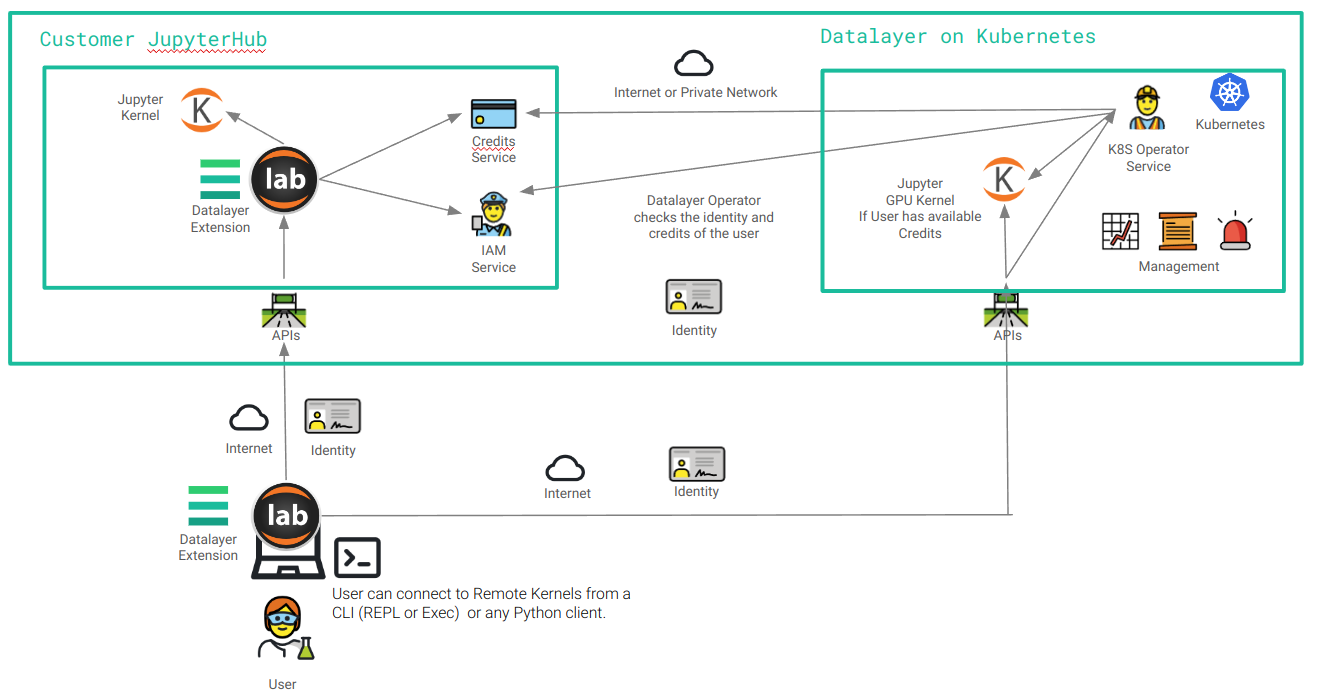JupyterHub Integration
Datalayer is engineered to function both as a standalone solution and in conjunction with industry standards like JupyterHub.
JupyterHub, a widely-used platform, can significantly benefit from the integration of Datalayer's Remote Kernels features. These enhancements are seamlessly incorporated, ensuring a transparent user experience.

JupyterHub administrators can effortlessly install the Datalayer extension to enable these features, providing users with an enriched computational environment.
Steps for Installation
Prepare the Environment: Ensure that the JupyterHub instance is up-to-date.
Install the Extension: Execute the installation command for the Datalayer extension. To access the Datalayer features from JupyterHub, you need to use a JupyterLab or Jupyter Notebook with the Jupyter Kernels extension installed. For Kubernetes based deployments of JupyterHub, you need to configure your deployment with singleuser.extraFiles.
# Example configuration.
singleuser:
extraFiles:
additional_jupyter_config:
mountPath: /etc/jupyter/jupyter_server_config.py
stringData: |
c.DatalayerExtensionApp.run_url="<RUN_URL>"
c.DatalayerExtensionApp.white_label=True
c.DatalayerExtensionApp.Launcher.category="GPU"
c.DatalayerExtensionApp.Launcher.name="GPU Kernels"
c.DatalayerExtensionApp.Launcher.icon_svg_url="https://raw.githubusercontent.com/datalayer/icons/main/svg/data1/gpu.svg"
Verify the Installation: Confirm the successful integration of Datalayer with JupyterHub: By following these steps, administrators can integrate Datalayer, leveraging its capabilities to augment the functionality of JupyterHub for all users.
User Flow
- User authenticates on Customer IAM
- User launches Kernel on Customer solution
- Users launches Kernels on Datalayer
- User provides Identity (e.g. JWT)
- Datalayer Operator calls the Customer to validate Identity (e.g. JWT…) and check available Credits
- If validated, Datalayer Operator assigns a Kernel to the User and burns-down the User Credits (based on Reservations)
Management
You need to provision the Kubernetes cluster with the CRD for Jupyter:
- Jupyterpool
- Jupyter Environment
- Jupyter Content
Datalayer ships the services on the Kubernetes cluster for:
- Observability with Prometheus, Grafana and Loki.
- Alerting with Prometheus.
- Credits Usage.
Custom IAM and Credits
IAM and Credit integrations between Customer and Datalayer, contact us to discuss your custom integration.